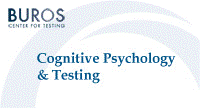Buros-Nebraska Series on Measurement and Testing

The Influence of Cognitive Psychology on Testing
Date of this Version
1987
Document Type
Article
Citation
From The Influence of Cognitive Psychology on Testing, edited by Royce R. Ronning, John A. Glover, Jane C. Conoley, and Joseph C. Witt (Hillsdale, NJ: Lawrence Erlbaum Associates, 1987)
Abstract
INTRODUCTION
One can understandably be skeptical when a "new perspective" is offered on a topic that has been under scientific examination for a very long time. I am not sure that I have any truly new perspectives , but I entertain the notion that my perspectives have the kind of novelty that will last long enough to permit taking a fresh look at some very old problems and getting new insights into their solution . I'm concerned with several such problems: First, what is an " ability"? How can an ability be defined? This is a problem that I believe has never been adequately addressed in the psychometric literature. Second, how can data from ability measurements be best analyzed to help in the definition of the ability, and thus to determine what has often been called the "construct validity" of the measurements? Third, what are the implications for the construction of better measurements of ability? Throughout my presentation, one detects influences from cognitive psychology-influences that I point out, but my primary concern is with psychometric aspects of ability measurements.
Here, I use the term "ability" in a very general sense, so that it covers both the concept of aptitude and the concept of achievement. At the stage of defining an ability , the difference between aptitude- thought of as a capacity for some future achievement- and achievement- thought of as the demonstration of some acquired performance- is irrelevant, because, as will shortly be seen, we are concerned in either case with deriving the definition of an ability from observations of performance. The question of the source of the performance (i.e., to what extent it comes through constitutional/genetic factors and to what extent it comes through learned experiences) need not enter discussion.
The American Heritage Dictionary defines ability as "the quality of being able to do something; physical, mental, financial, or legal power to perform." We can immediately drop consideration of financial and legal powers; from the standpoint of psychological and educational measurement we can be concerned, however, with physical and mental powers. Nevertheless , even the definition offered by the dictionary has an air of circularity: Ability is defined in terms of "being able to perform something," and ironically enough, the word able is defined in terms of "having sufficient ability." I'm afraid the dictionary is of little help in defining " ability," except possibly in the phrase "ability to perform something." What is this something? In the context of psychological and educational measurement, must it not refer to some class of tasks? If we think of commonly recognized abilities such as athletic ability, or musical ability , the common assumption is that a person with such an ability is able to perform well a variety of tasks that can be called athletic, or musical , as the case may be. When psychologists and educators speak of "mental ability," they are referring to performance in a variety of "mental" tasks . The question is, what is a "mental" task?
We know that abilities are often of a more specialized character. A good basketball player is not necessarily a good 100-yard runner; a good pianist is not necessarily a good composer, or not even a composer at all. Evidence from factor-analytic investigations of mental abilities suggests that there exist a number of somewhat unrelated mental abilities: verbal ability, reasoning ability , spatial ability , numerical ability, and so on. Correlational and factor-analytic evidence is of some use in classifying and identifying abilities, because it yields information on what abilities are likely to go together or to be separate. More precisely, it yields information on the classification of the tasks that call for different abilities.


Comments
Copyright © 1987 Lawrence Erlbaum Associates, Inc. Digital Edition Copyright © 2012 Buros Center for Testing.